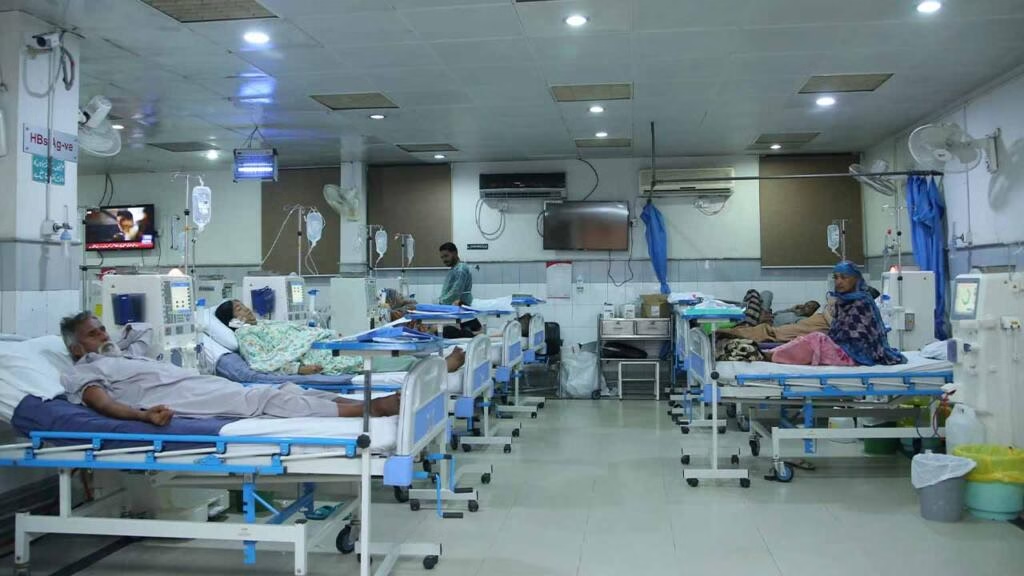The diarrhea outbreak in Jamshoro District has claimed nine lives, causing serious concern among local residents and health authorities. The outbreak began in UC Mall of Thano Bula Khan Tehsil, Sindh, and has rapidly spread to nearby villages, exposing the weaknesses in healthcare infrastructure and access to clean water in the region. According to reports, seven of the deceased belonged to Goth Faiz Muhammad Bro, while two victims were from neighboring villages. Although the situation is said to be under control, the incident has once again highlighted the urgent need for improved sanitation, safe drinking water, and better medical facilities in rural Sindh.
The Extent of the Diarrhea Outbreak
Health department officials have confirmed that the diarrhea outbreak in Jamshoro District has affected multiple villages, with new cases still being reported. Villagers have been suffering from severe dehydration and stomach infections due to contaminated water sources. Local hospitals are struggling to accommodate patients as medical facilities are limited. According to DHO Jamshoro, Dr. Pir Manzoor, the situation has been stabilized to an extent, but further vigilance is required to prevent the spread to other areas.
Assistant Commissioner Thano Bula Khan stated that emergency measures have been taken, including supplying clean water through tankers. However, he emphasized that this is a temporary solution and that a permanent resolution must be implemented to ensure access to clean and safe drinking water for the residents.
Root Causes Behind the Outbreak
The diarrhea outbreak in Jamshoro District is largely attributed to the consumption of contaminated water. Many remote areas in Thano Bula Khan rely on wells and small ponds for their water supply, which are often polluted with bacteria and waste. Inadequate sanitation, poor waste disposal systems, and lack of hygiene awareness have further worsened the situation.
Experts believe that such outbreaks occur repeatedly because preventive measures are not consistently enforced. During the summer months, the risk of diarrhea and other waterborne diseases increases significantly due to rising temperatures, stagnant water, and lack of proper filtration systems.
Lack of Medical Infrastructure
One of the major issues faced by residents during the diarrhea outbreak in Jamshoro District is the absence of adequate healthcare facilities. Locals have reported that the area has only one small dispensary, which is insufficient to handle an emergency of this scale. The nearest government hospital is located miles away, making it difficult for seriously ill patients to receive timely treatment.
The delay in medical attention often leads to fatal complications, particularly among children and the elderly. Health experts stress that rural healthcare systems need to be strengthened with more doctors, medical supplies, and disease surveillance teams to manage such crises effectively.
Government and Health Department Response
In response to the crisis, local authorities have launched a coordinated relief effort. Clean drinking water is being supplied through tankers, and medical teams have been dispatched to affected villages. DHO Jamshoro Dr. Pir Manzoor has assured that health officials are monitoring the situation closely to prevent further casualties.
The diarrhea outbreak in Jamshoro District has also prompted discussions about long-term infrastructure improvements. The provincial government has been urged to prioritize clean water projects, improve sewage systems, and invest in community-level awareness programs about hygiene and sanitation.
The Importance of Hygiene Awareness
While immediate relief measures are important, long-term prevention relies on public education. Awareness campaigns on handwashing, safe food handling, and proper sanitation can drastically reduce the spread of diarrhea and similar infections. Communities need to be educated about boiling water before consumption and maintaining cleanliness in their surroundings.
In rural areas, lack of awareness often leads to the use of unsafe water sources for drinking and cooking. The diarrhea outbreak in Jamshoro District serves as a reminder that health crises can be avoided through preventive education and community involvement.
Moving Toward a Sustainable Solution
To prevent future outbreaks, experts recommend the establishment of sustainable water purification systems and the construction of small health units across rural Sindh. Strengthening healthcare infrastructure, providing rapid testing kits for waterborne diseases, and implementing vaccination drives can significantly reduce mortality rates.
The provincial and federal governments must also work together to develop early warning systems and emergency response plans. By integrating community health workers and local councils into disease control programs, authorities can ensure timely reporting and management of outbreaks like this one.
The diarrhea outbreak in Jamshoro District has revealed the urgent need for improved water management, healthcare access, and public health education in rural Sindh. Although immediate measures have helped control the situation, long-term solutions are vital to prevent future health emergencies. Clean water, proper sanitation, and accessible healthcare should not be considered luxuries but fundamental human rights.
Unless these issues are addressed at their root, communities like those in Thano Bula Khan will continue to face the devastating consequences of preventable diseases such as diarrhea.



